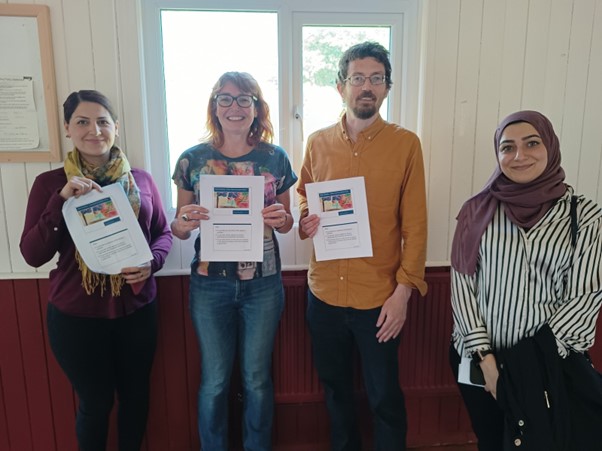Kent Law Clinic staff and students have been involved in a project to deliver legal advice workshops to asylum seekers residing at Napier Barracks, in collaboration with local charities Samphire and Napier Drop-In.
By Dr Richard Warren, Immigration Law Adviser & Lecturer, Kent Law Clinic
Since September 2020, Napier Barracks on the outskirts of Folkestone in Kent has been used to accommodate male asylum seekers, sometimes for significant periods of time. Residents at the camp come from a number of well-known refugee-producing countries including Iran, Iraq, Afghanistan, Syria and Sudan. A recent report by the Jesuit Refugee Service (JRS) [1] has outlined the poor living conditions which residents face, noting specifically the uncertainty faced by those who are unsure what is happening in their asylum claim. The camp was also subject to a scathing High Court judgment in June 2021 in which Mr Justice Linden was unable to accept that the accommodation there ensured a standard of living which was adequate for the health of the claimants.[2] Despite assurances by the Home Office that improvements have been made following that High Court case, the JRS report has documented continuing concerns including difficulties in accessing basic necessities including shoes and winter clothes, inadequate healthcare and barriers to accessing legal advice.
The current historic backlog in the asylum process has been widely reported, with more than a 173,000 applicants’ claims still outstanding,[3] some of whom have been waiting years for a decision. A significant number have received no legal advice since arriving in the UK – again a situation that has been well documented.[4]
As a result, individuals are receiving notices of intent to declare their claims inadmissible, with the possibility of removal to Rwanda[5] without the ability to make representations to the Home Office. The policy of declaring claims inadmissible where an individual has passed through a so-called safe third country has been in place since January 2021 when the UK left the EU and so ended its participation in the Dublin 3 Regulation.[6] In June 2022, s16 of the Nationality and Borders Act 2022 placed the process on a statutory footing.[7] However, that process, arguably an essential part of the government’s aim to ‘stop the boats’, cannot currently be implemented. Currently there are no returns agreements with any major countries of transit, including with any EU country. And the proposed policy of removals to Rwanda is on hold pending the outcome of an appeal against the High Court judgment last year.[8] It is therefore unsurprising that the backlog of undecided cases has risen. For those at Napier Barracks the uncertainty of knowing whether they are even going to have their asylum claim considered is clearly taking its toll.
It is against this background that the Kent Law Clinic agreed to run a legal advice session at a local drop-in centre for Napier residents in need of legal advice. The workshop provided a basic overview of the asylum system, including information on inadmissibility, the decision-making process and rights of appeal. Kent Law Clinic student volunteers assisted with interpreting. The session was well received, and the Clinic plans to run further sessions in the future.
[1] JRS-UK-Report_Napier-Barracks-the-inhumane-reality_March-2023_WEB.pdf (jrsuk.net)
[2] NB & Ors, R (On the Application Of) v Secretary of State for the Home Department [2021] EWHC 1489 (Admin) (03 June 2021) (bailii.org)
[3] National Audit Office report 16/6/23 https://www.nao.org.uk/wp-content/uploads/2023/06/the-asylum-and-protection-transformation-programme.pdf
[4] 628f50a1917c740a7f1539c1_No access to justice- how legal advice deserts fail refugees, migrants and our communities.pdf (website-files.com)
[5] UK-Rwanda Migration and Economic Development Partnership – House of Commons Library (parliament.uk)
[6] EUR-Lex – 02013R0604-20130629 – EN – EUR-Lex (europa.eu)
